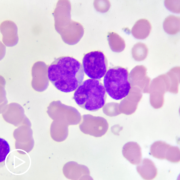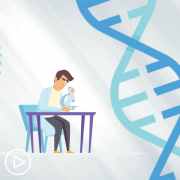What Should You Know About the Future of CLL Treatment?
What Should You Know About the Future of CLL Treatment? from Patient Empowerment Network on Vimeo.
As chronic lymphocytic leukemia (CLL) research continues to expand, more treatment options for patients with CLL are emerging. Dr. Susan O’Brien, a hematology-oncology specialist, discusses recent CLL treatment developments.
Dr. Susan O’Brien is the Associate Director for Clinical Science, Chao Family Comprehensive Cancer Center.
See More From The Pro-Active CLL Patient Toolkit
Related Resources

|
 How to Be A Partner in Your CLL Care How to Be A Partner in Your CLL Care |
 Key CLL Treatment Decision-Making Factors Key CLL Treatment Decision-Making Factors |
Transcript:
Katherine:
All right. How do you feel – how do you feel about the future of CLL treatment? Are you hopeful?
Dr. Susan O’Brien:
Absolutely. I think we’ve had something like six drugs approved in the last seven years, which is mindboggling. I think in the 30 years before that, we didn’t even have six drugs approved. That’s how rapidly – it’s mindboggling, really. That’s how rapidly the field is moving forward. And not just CLL, but other cancer fields also are moving at a very dizzying pace.
Which is great because that – anything that gives us more options is wonderful. So, I am very, very optimistic about CLL going forward. And I’m also very hopeful that some of these combination regimens might actually be – small molecules might actually be curative in the long run. But I will say it’s way too early to know that.
Katherine:
Are there emerging treatments that patients should know about?
Dr. Susan O’Brien:
So, one of the categories we haven’t talked about, where there actually are two FDA approved drugs, are PI3K inhibitors – that’s another oral small molecule. They’re not approved for frontline therapy. So, that’s kind of why we weren’t talking about them so much today where we’re talking about making a choice for the first therapy. But they are approved for patients where the disease reoccurs.
And there’s two of those as we mentioned. We have antibodies, which we really haven’t talked about very much, and then there’s new classes of drugs that are being explored in clinical trials. So, for example, there are interesting drugs which are antibodies that bind to the patient’s own T-cells and they also mind the CLL cells and they redirect the T-cells towards the CLL cells.
Kind of like CAR-T but inside the body without having to take out the T-cells. So, those are really interesting class of drugs. None have been yet approved in CLL or lymphoma, but I think those are on the horizon and looking very promising.










